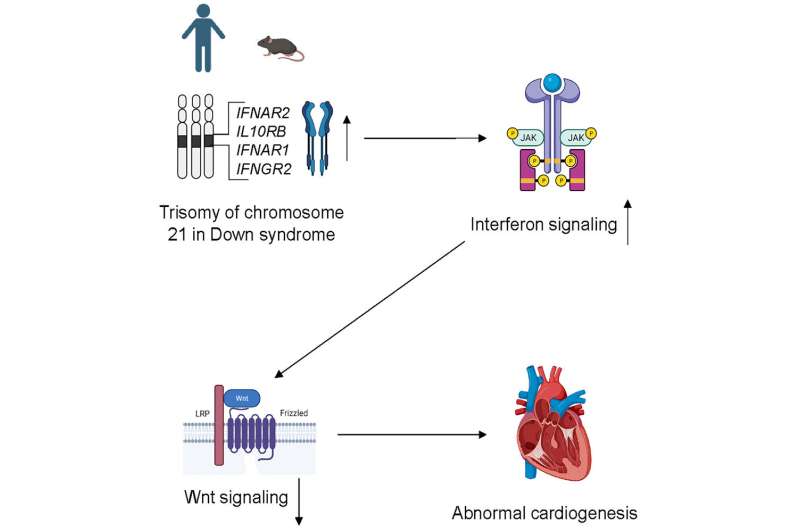This article has been reviewed according to Science X's editorial process and policies. Editors have highlighted the following attributes while ensuring the content's credibility:
fact-checked
peer-reviewed publication
trusted source
proofread
Scientists discover mechanism affecting heart development in Down syndrome

Infants born with Down syndrome, the genetic condition caused by an extra copy of chromosome 21, or trisomy 21, are highly predisposed to congenital heart defects. It is estimated that nearly half of newborns with Down syndrome have a congenital heart malformation, and Down syndrome is recognized as the most common cause of congenital heart abnormalities. Despite many research efforts over several decades, the mechanisms by which trisomy 21 prevents proper formation of the heart during embryonic development have remained unknown.
A recent study by scientists at the University of Colorado Anschutz Medical Campus reports the discovery of a molecular mechanism contributing to defective heart development in Down syndrome. The research team, led by Dr. Kunhua Song, associate professor of medicine, employed a combination of experiments using human cells with and without trisomy 21 and a mouse model of Down syndrome to illuminate the molecular basis of impaired heart formation.
The research is published in the journal iScience.
Using pluripotent stem cells obtained from research participants in the Human Trisome Project, a large study of people with Down syndrome led by the Linda Crnic Institute for Down syndrome at the University of Colorado, the team modeled the initial steps of heart formation, or cardiogenesis, in the laboratory. They observed that trisomy 21 impaired cardiogenesis, and this malfunction was associated with hyperactivity in the cellular response to viral infections, known as the interferon response. Then, using genetic and pharmacological approaches, they demonstrated that blocking the interferon response improved cardiogenesis in the laboratory.
"We were surprised to see strong activity of the interferon response during differentiation of pluripotent stem cells into heart muscle cells with trisomy 21. We now appreciate that an abnormally high interferon response could be detrimental to early heart development," explains Dr. Song.
The researchers continued their investigation into how exactly interferon hyperactivity impaired cardiogenesis, which led them to discover that the interferon response inhibits a series of key molecular events required for heart development, such as the Wnt signaling pathway.
According to Dr. Congwu Chi, lead author of the paper, "Too much interferon activity leads to too little Wnt signaling, which in turn impairs heart muscle cell function. Discovering this cascade of events illuminates potential strategies to ameliorate improper heart formation in Down syndrome by toning down interferon signaling and/or bumping up Wnt signaling."
To test this therapeutic strategy in a mouse model of Down syndrome, the investigators treated pregnant female mice with a medicine that reduces the interferon response, known as a JAK inhibitor, and monitored the effects on heart development in the embryos carrying a genetic alteration equivalent to trisomy 21. Indeed, treatment of pregnant mice with the JAK inhibitor caused a remarkable improvement in cardiogenesis in mice.
"These are very important results, because they suggest a potential pharmacological strategy for pre-natal treatment of one of the most harmful impacts of trisomy 21. Babies born with Down syndrome and congenital heart defects face a number of challenges, from the need of heart surgery soon after birth to long lasting impacts on their physiology later in life. However, a lot of additional research will be needed to define the safety and efficacy of using JAK inhibitors during pregnancy," explains Dr. Joaquin Espinosa, executive director of the Linda Crnic Institute for Down syndrome and co-author of the paper.
Dr. Espinosa and his team are currently leading clinical trials studying the benefits of JAK inhibitors in older children and adults with Down syndrome.
These findings expand on a growing body of evidence demonstrating the harmful effects of interferon hyperactivity in Down syndrome, even during early stages of embryonic development. The results also support the idea that many of the hallmarks of Down syndrome are driven by lifelong dysregulation of the immune system and that restoring immune balance could provide therapeutic benefits.
"This body of work is proof of the rapid scientific advances that can take place with the right investment of resources and the willingness of individuals with Down syndrome to participate in research," says Dr. Espinosa.
More information: Congwu Chi et al, Interferon hyperactivity impairs cardiogenesis in Down syndrome via downregulation of canonical Wnt signaling, iScience (2023). DOI: 10.1016/j.isci.2023.107012



















